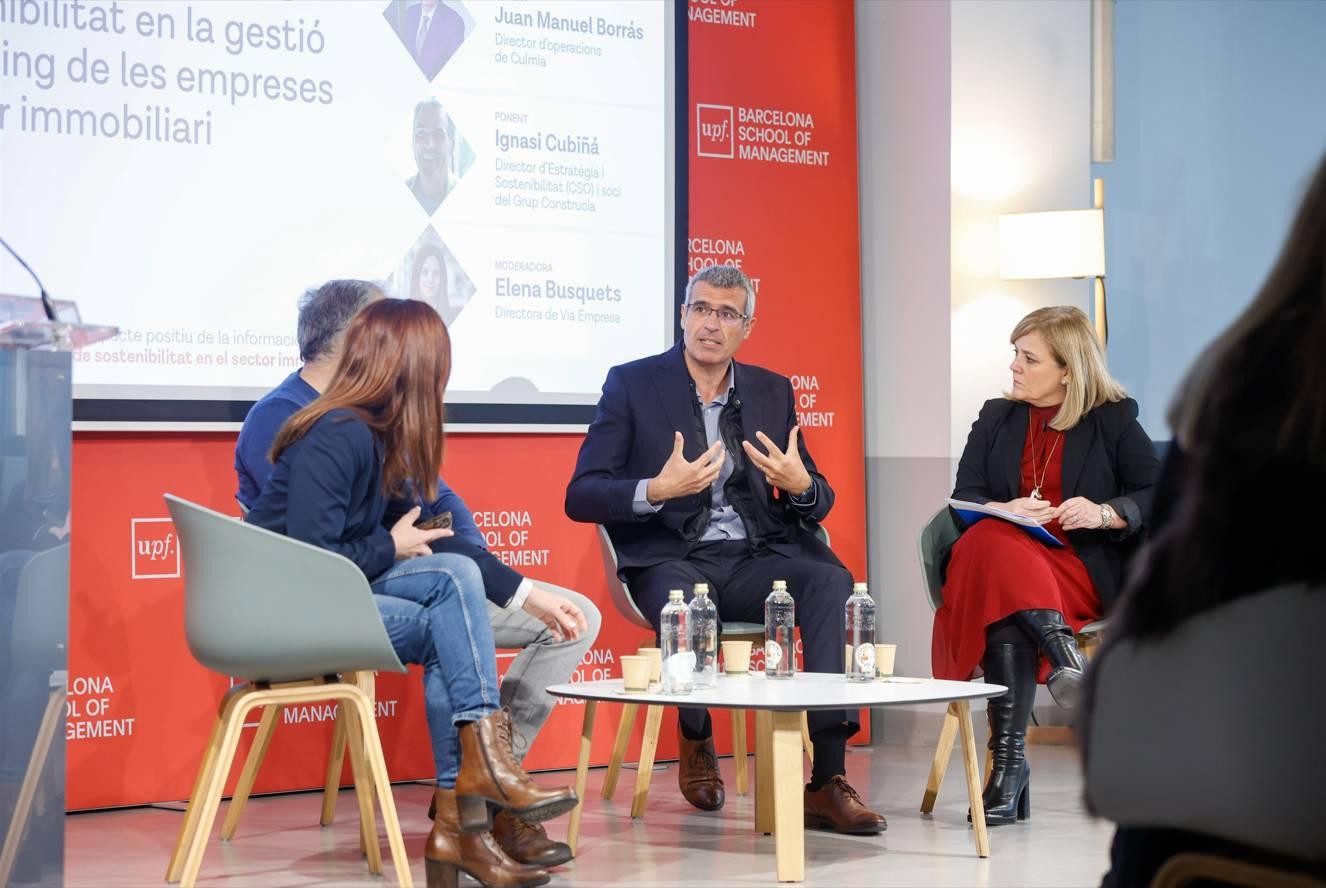Information for:

- Masters
- Postgrad courses
- Courses
- Faculty and research
- About UPF-BSM
Transforming the future of the real estate sector to ensure sustainability
4 Marzo - 2024
The Chair of Decent and Sustainable Housing of the UPF Barcelona School of Management, in collaboration with the Metropolitan House Foundation, has presented the results of its innovative study entitled "Sustainability Balanced Scorecard for the Housing Sector", undertaken by Ramon Bastida, the Director of the Chair, and Pablo Verdugo, a business consultant and collaborating researcher.
According to Bastida, the study aims to propose two models of a balanced scorecard adapted to the real estate sector, focusing on identifying key sustainability factors and developing a dashboard of indicators to measure performance in relation to these aspects.
In this regard, he emphasized the importance of the United Nations’ Sustainable Development Goals (SDG) and the European Union’s European Green Deal initiative for boosting sustainability in all sectors, including real estate. Bastida highlighted that the sector has a significant impact on greenhouse gas emissions, energy and water consumption, working conditions and the gender wage gap, among other aspects. He underlined the need to adopt measures to meet the objectives set by the EU.
During the presentation of the study’s results, he emphasized the importance of incorporating sustainability within the business strategy, as well as having a long-term vision, bearing in mind that the useful life of a building spans over more than 50 years. In addition, he refuted the idea that sustainability is expensive in the long run, arguing that the financial and environmental benefits offset any initial investment.
Experts and companies in the real estate sector come together to discuss the integration of sustainable practices
The round table on sustainability in the real estate sector brought together top experts and leading companies in the industry. Moderated by Elena Busquets, the Director of Via Empresa, the discussion focused on integrating sustainable practices within day-to-day operations and business reporting.
Miriam Porres, the Director of CSR and Compliance at Sorigué, highlighted the philosophy embraced at the family company, focusing on excellence and responsibility towards the environment and people. She underlined the importance of companies’ awareness of the impact of working with natural resources on the planet and society,
Meanwhile, Juan Manuel Borrás, the Director of Operations at Culmia, shared some practical cases of integrating sustainability within his projects, from creating internal sustainability certificates to building industrialized residential properties with high energy efficiency standards.
Lastly, Ignasi Cubiña, the Director of Strategy and Sustainability at the Construcía Group, highlighted the need for a systemic approach towards sustainability in the construction sector. On this point, he discussed the importance of circularity and the use of recycled materials, as well as the need for precise data and clear regulations in order to drive the transition towards more sustainable economic models.
The experts also discussed the challenges faced by companies, and SMEs in particular, on the road towards sustainability. They underlined the importance of partnerships and associations in the sector to share knowledge and best practices, as well as the need for tools and accurate data for making informed decisions.
Awards for the Best Master’s Theses
To bring the event to a close, the awards were presented for the best Master’s Theses related to the field of decent and sustainable housing. The top award went to Hugo López González, for his project entitled “Deco Living. The Sustainable Transition of an Artist’s Co-Living”. The runner-up was the project “The Economic Impact of Sustainability: An Application in the Real Estate Office Sector” developed by Vanessa Lastra, Fátima Villar and Marta Clavijo.
The event was hosted by the Director General of the UPF-BSM, José Manuel Martínez-Sierra, and Rafael Angulo, the President of the Metropolitan House Foundation.
Angulo stated that sustainability is a permanent trend, emphasizing that, while residential properties are primarily sold based on their aesthetic qualities, their energy efficiency is becoming an increasingly crucial factor. With this in kind, he advocated the need to rehabilitate residential properties to improve their efficiency, adding that it will not be possible to let such properties without taking this factor into consideration.
José Manuel Martínez Sierra then went on to underline the importance of tackling the impact of sustainability on companies in the real estate sector in terms of the current business model, in which financial results can no longer be separated from the environmental impact. He also stressed the importance of the School’s continuous collaboration and commitment to sustainability. On this point, he highlighted how crucial it is to continue the School’s partnership with the Metropolitan House Foundation over time, emphasizing their shared values.